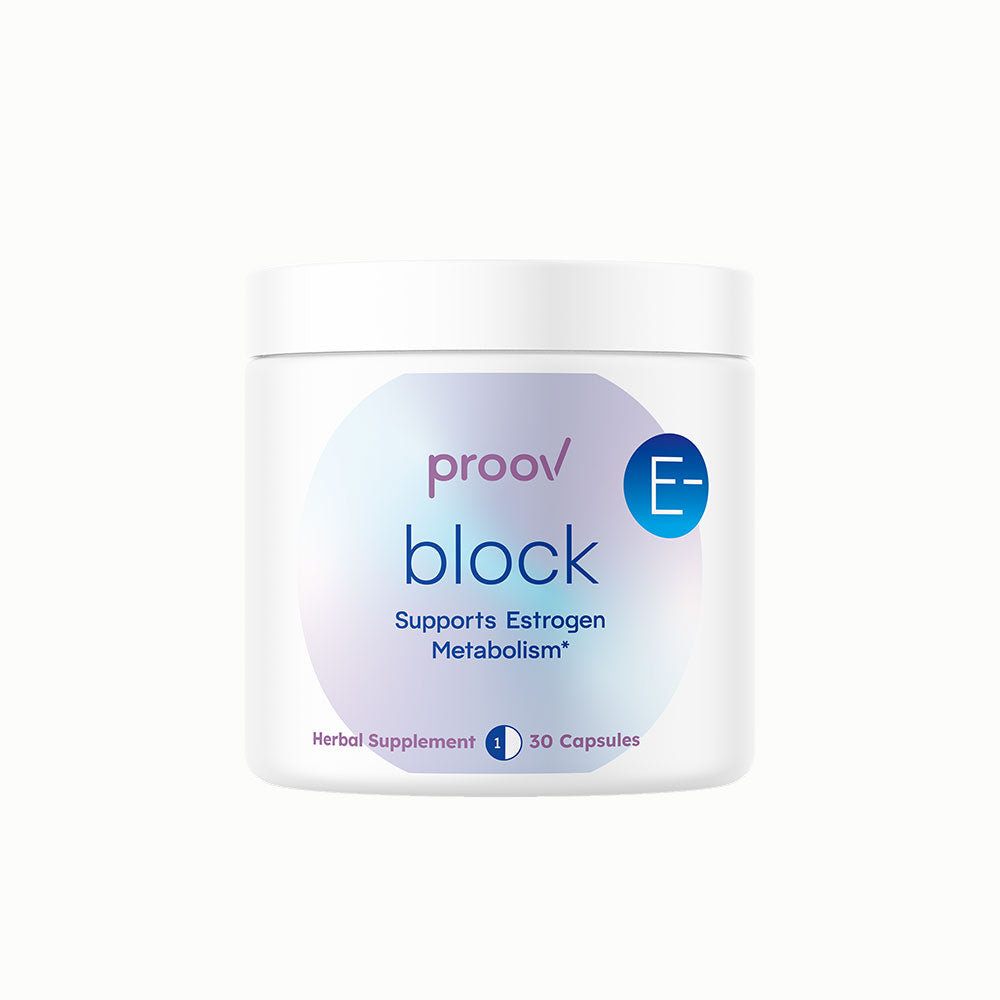Written by: Dr. Amy Beckley, PhD, Founder and CEO of Proov — a women’s health company dedicated to helping women unleash the power of their cycle hormones to live and feel their best.
If you’re in touch with your cycle hormones, you likely know how they change throughout your cycle. These tiny but mighty messengers regulate the cycle, including your period, ovulation, and ability to conceive.
But hormones also change as you change. From puberty to reproductive years, and all the way to perimenopause, hormone levels shift along with your stage of life.
Follicle stimulating hormone (FSH) provides insight into you cycle at all life stages, especially as you make the transition into perimenopause and menopause. Keep reading to learn more about what FSH level indicates menopause.
What is FSH and why is it important?
Follicle stimulating hormone (FSH) does exactly what it says — it stimulates the ovaries to produce follicles each cycle.
The start of your period marks the beginning of the next cycle. This signals to your brain that it’s time to prepare a new egg for ovulation. To do this, it sends FSH to your ovaries.
Think of FSH like the fuel your ovaries need to grow follicles, like how a car needs gas to run. FSH gives your ovaries the energy they need to start growing follicles and maturing eggs. Eventually, one follicle and egg will become the most mature; this is the egg that will ovulate that cycle.
At this point, you may know that people with ovaries are born with all the eggs they’ll ever have — this is referred to as your ovarian reserve. As you age and cycle over and over again, the amount of eggs you have slowly decreases over time.
When the ovaries have lots of eggs left, they don’t need as much FSH to help recruit follicles because they have so many options to choose from. However, as you age and ovulate each cycle, you have less and less eggs to choose from.
With less eggs to recruit and mature, the ovaries need a little extra help to prepare for ovulation. So, the brain sends more FSH to the ovary. This is why low FSH levels signal a high ovarian reserve and high FSH levels signal a low ovarian reserve. (We know — it’s a little confusing!)
Perimenopause vs. Menopause
We find that most people are interested in knowing the connection between FSH and menopause.. But, what many don’t realize is that FSH can come into play much earlier than menopause, during perimenopause.
That’s right — there is a transition period leading up to menopause. Perimenopause refers to the transition to menopause that occurs over time as the number of eggs you have left decreases. It’s a completely normal biological process that we’ll all go through — although it looks slightly different for everyone!
Perimenopause typically begins in your early to mid 40s, although some may experience symptoms of perimenopause as early as their 30s. For most people, perimenopause lasts several years — anywhere from 2 to 10 in total.
As you already know, your egg supply slowly decreases during perimenopause and your ovaries may not be working quite as well as they did during your 20s. On top of struggling to produce a mature egg each cycle, they also may have a harder time producing optimal levels of reproductive hormones, such as estrogen and progesterone.
Poor hormone production or hormone imbalance leads to the notorious “menopause symptoms” we all hear about when we’re younger, including:
- Irregular periods
- Hot flashes
- Night sweats
- Problems sleeping
- Vaginal dryness
- Brain fog
- Mood changes
- Low sex drive
While perimenopause refers to a long period of time characterized by decreased ovarian reserve and changes in hormone levels, menopause refers to a single moment — when you stop ovulating. You are considered “in menopause” (also sometimes called “postmenopause”) when you go a full 12 months without having a period.

You are considered “in menopause” when you go a full 12 months without having a period.
What level of FSH indicates menopause?
Since FSH relates so closely to ovarian reserve and our journey to menopause, understanding your FSH levels is a great starting point for insight into your menopause status. As we mentioned, high FSH signals a low ovarian reserve, so the higher your levels are, the closer you are to menopause.
Here’s a breakdown of FSH levels (all mIU/ml) and what they may indicate:
- 10 or less: Low FSH is typically seen in those under 30 years old and usually indicates high ovarian reserve.
- 11-15: Slightly elevated FSH is typically seen in those in their 30s and may indicate a slow decrease in ovarian reserve.
- 16-24: Elevated FSH is typically seen in those between late 30s and late 40s. Usually, FSH levels like these are accompanied by perimenopause symptoms and likely indicate you’re in the perimenopausal transition.
- 25+: This is the FSH level that indicates menopause. Consistent FSH levels over 25 means you are likely in menopause and have depleted your ovarian reserve (which, remember, is totally normal and we’ll all reach this point eventually!).
You may be thinking, All this information is great, but how do I know what my FSH level even is? And that’s a great question! Testing your FSH levels is an important step to learning more about your ovarian health at any life stage.
How do I measure FSH?
While we always recommend discussing any serious concerns with your doctor, you can measure FSH levels over time at home with Proov Reserve FSH tests. Proov Reserve allows for non-invasive, inexpensive ovarian reserve tracking, so you can keep track of the number of eggs you have over time without needing a blood test.
Reserve FSH tests are designed to be read with the Proov Insight app, which provides your FSH level and allows for easy digital tracking over time. Since understanding your FSH levels is critical over the entire perimenopausal transition, tracking FSH with Proov gives you even more insight into your status and helps you plan ahead.
Here at Proov, we believe any and all information about your hormones is powerful! Insight into your FSH levels and menopause status can ensure you’re set up to live and feel your best, at any life stage.













